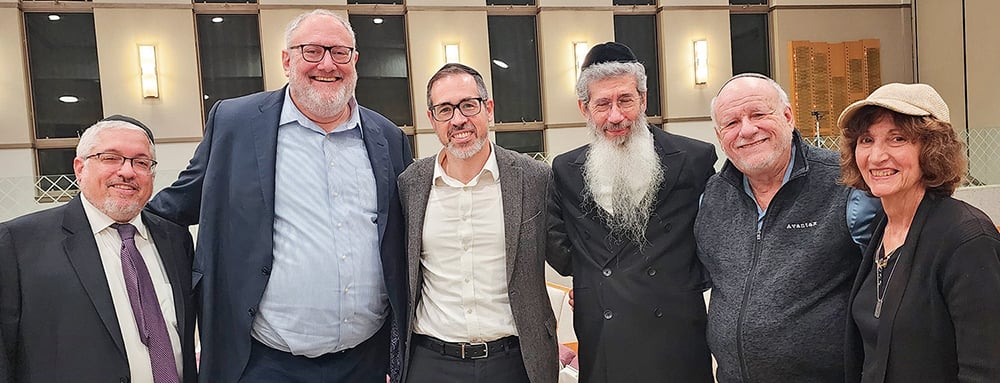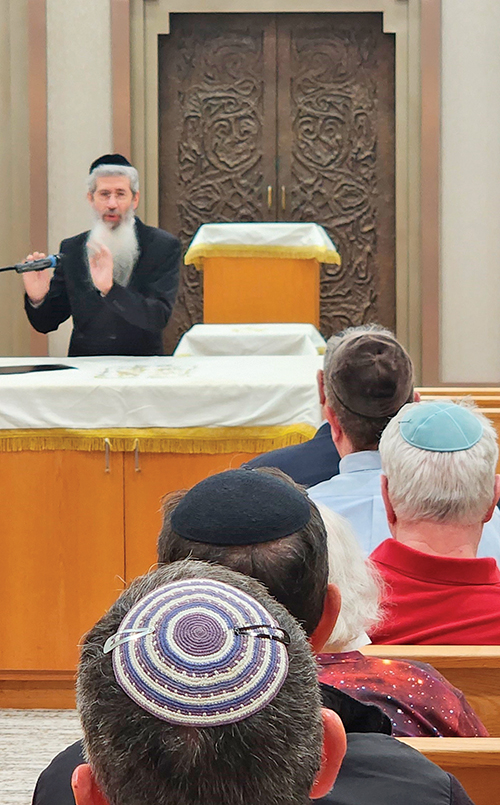
Rabbi Dovid Goldwasser spoke at Young Israel of East Brunswick (YIEB) on Monday, September 30 at what has become his annual pre-Rosh Hashanah presentation. This year’s topic, “Life Changing Moments,” was certainly relevant after the tumultuous year we have experienced. Rabbi Goldwasser is a prominent rav and Torah personality, a daily radio commentator who has authored over a dozen books, and is also a renowned speaker recognized for his exceptional ability to captivate and inspire audiences worldwide. The lecture was sponsored by Rosenbaum Financial Services and the Wasser Jewish Learning Institute.
Speaking just two days before Rosh Hashanah, Rabbi Goldwasser thanked the nearly 75 people in attendance for being brave and coming at such a busy time of the year—a year that should be a good one here as well as in Eretz Yisrael.
Starting out with the acknowledgement that the shofar is the main mitzvah of Rosh Hashanah, Rabbi Goldwasser asked what we would do if there was a shul that had a chazzan but lacked a shofar and there was another shul that had a shofar but lacked a chazzan. Which shul would we attend? It is clear we should go with the shofar as it is the mitzvah of the day when Hashem gets off the chair of judgment and goes to the chair of compassion. The further explanation of the source of the shofar goes back to Abraham’s sacrifice of his son, Isaac. At the last instant, an angel called out that Abraham was to release Isaac and sacrifice a ram instead. Abraham found the ram in a nearby thicket, but his horns were stuck in the branches and it was hard to take him out. Each time Abraham would try to free the ram, his horns would become more stuck—symbolizing that the Jewish people would be enslaved and caught multiple times until ultimately freed.

We have gotten caught and entangled in exile many times, from the inquisition in Spain to the horrors of Nazi Germany to the ongoing situation with Iran. But, says Rabbi Goldwasser, we will prevail. Hashem freed us from each place, yet the situation we are in now may be the worst yet. The Klausenberger Rebbe says Hamas and Iranian proxies are worse than the Nazis, but there is a positive note in how there has been an increase in the number of people who did teshuva and increased their level of observance based on what happened on October 7. Formerly irreligious IDF soldiers are requesting tefillin, observing Shabbat, and women are baking challah and partaking of those mitzvot. A secular irreligious woman in Be’eri saw a myriad of horrific things while trying to hide and save her two small children. At the last moment she began to pray to God saying she was unworthy, but she would resolve to light Shabbat candles if her children would be saved. In a major miracle, the terrorists did not enter her home. There was a reception the following Shabbat with 250 women and girls as she lit Shabbat candles for the first time and made a Shechianu. This is the shofar in our day, serving as an inspiration for all of us to add on mitzvot. Prior to October 7, people would rush out or leave morning prayers early to get to work. Now everyone stays until the last bit of Tehillim. Almost a year later, and the Tehillim groups and additional mitzvot are as strong as they were at the inception.
Hashem tries to send us messages all the time, it is up to us to interpret the messages properly and act accordingly. If we lose our wallet, do we attribute it to
carelessness or not putting it away securely? Or do we get the message that Hashem wants us to do teshuva and repent? Maybe Hashem is trying to tell us something at each turn? If we break expensive china, do we say it is carelessness, or is it a message from Hashem and it was supposed to happen?
It is said that the generation of Moshiach will have chutzpah. But is it good or bad chutzpah? Bad chutzpah is the young generation that won’t give up a seat on the train to an elderly or disabled person; good chutzpah is wearing a kippah or carrying an Israeli flag on many college campuses. Are we seeing a signal from Hashem?
Rabbi Goldwasser shared a few other anecdotes where adding religious observance significantly improved health outcomes where there was no prior hope, and added that the Hebrew words for shofar and improve share the same roots. The call of the shofar implores us to improve and now is the time to do so. Rabbi Goldwasser concluded that Rosh Hashanah is here for us, as is the shofar. He added that we should all have a year of ‘simchas and yeshuas’ and that his lecture for next year should be for all of us in Israel.
This is the third year that Rabbi Goldwasser has come to YIEB under the sponsorship of Bea and Ralph Rosenbaum. According to Bea, “His message was so well received by the community. Everybody loved the speaker, so we agreed to sponsor him again.” “His stories are very moving and I was nearly brought to tears by some of them,” added Ralph.
YIEB Rabbi Yehoshua Hess added, “We are pleased to have Rabbi Goldwasser bring his inspiration and ‘chizuk’ before Rosh Hashanah and Yom Kippur to center us before the holiest day of the year.”









